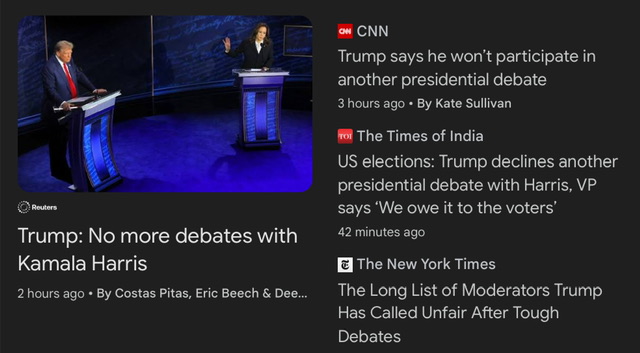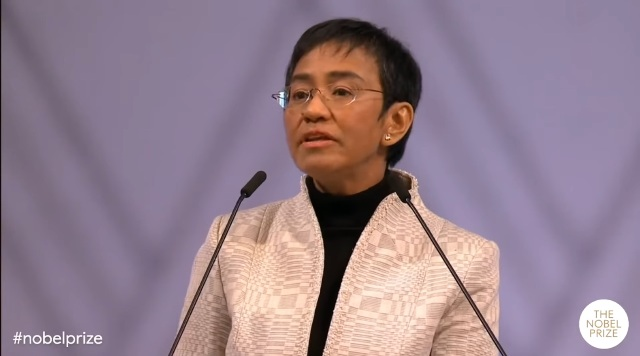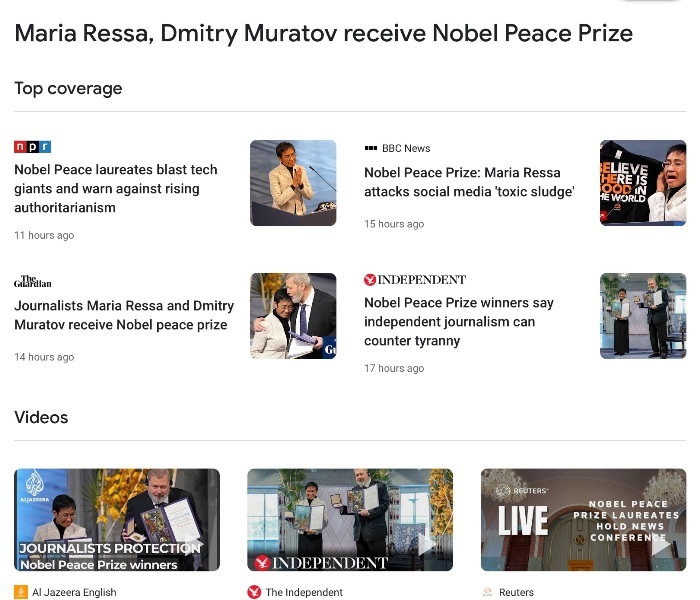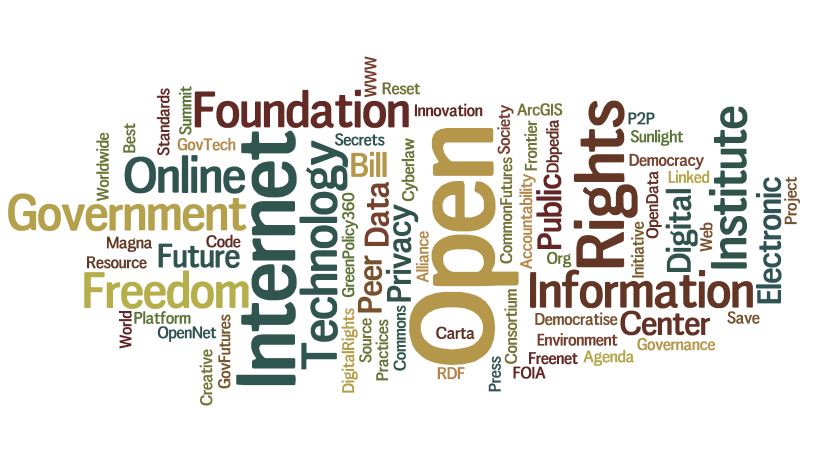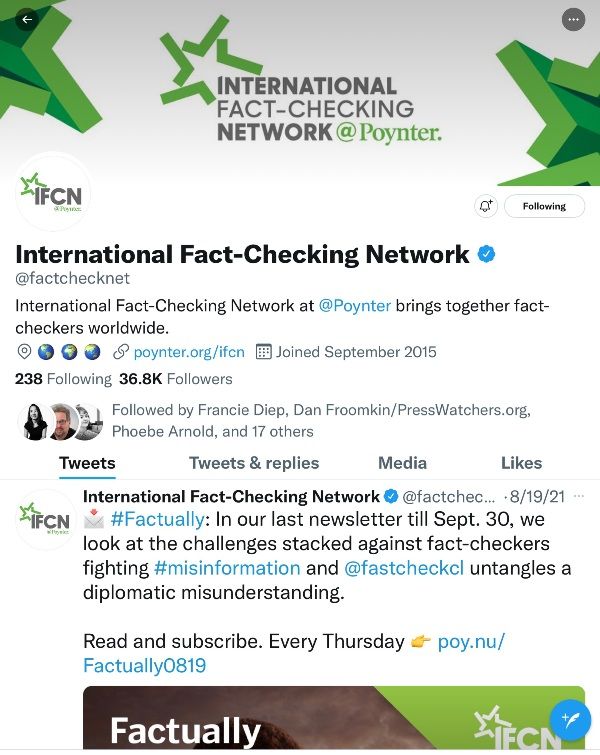Fact Checking, Facts Count
GreenPolicy360 continues a multi-year defense of facts, science, & 'critical thinking skills'
-- "In Democracy, 'Facts Count'"
🌎
🌎
An independent press is critical to sustaining democracy, says Harvard professor
Hundreds of fact-checkers from around the world attended the Poynter Institute's International Fact-Checking Network GlobalFact 11 Summit
Poynter Institute's Fact Checking -- the PolitiFact model and the International Fact-Checking Network -- Continue into a Second Decade
2024 -- Continuing to Grow a Global Fact-Checking News Model & Defense of Democratic Institutions
GlobalFact 11
Maria Ressa, Nobel Peace Prize Winner, is a Keynote Speaker at the 2024 Global Fact-Checking Summit
Journalist and Nobel Peace Prize winner Maria Ressa, is the featured keynote speaker at GlobalFact 11, and joined by experts in journalism, democracy, artificial intelligence and debunking online misinformation.
Additional speakers at the fact-checking summit include Steve Levitsky, Nikita Roy and Craig Silverman.
SARAJEVO, Bosnia and Herzegovina – Though democracies have demonstrated surprising resilience in recent decades, populism has emerged as a major threat, Harvard government professor Steven Levitsky warned fact-checkers.
Populist candidates are winning elections today much more frequently than at any other time in history, Levitsky told attendees at GlobalFact 11, an annual fact-checking conference by Poynter’s International Fact-Checking Network held this year in Sarajevo. One of the reasons populism is on the rise is because political establishments — which include political parties, large interest groups and major traditional media outlets — are weakening. Populists no longer need the resources provided by political establishments to run for office.
Establishments do not act as a single entity, Levitsky said. “But collectively, political establishments do tend to impose certain parameters on politics, both in terms of political style and in terms of policy substance.”
The weakening of political establishments is “unquestionably” democratized as it opens up the political system to a wider array of people, said Levitsky, who was interviewed by IFCN director Angie Drobnic Holan. But it also means that democratic institutions are left vulnerable to anti-system forces.
Though populism is not inherently anti-democratic, recently elected populists such as former U.S. President Donald Trump have been more likely to threaten democratic institutions.
Still, Levitsky said, there is hope. There are as many democracies today as there were in the early 2000s despite an overall deterioration in the conditions for such institutions.
In the 1990s, democratic governing systems seemed to be on the verge of becoming ubiquitous. Between 1975 and 2000, the number of democratic countries nearly tripled. But in recent decades, the rise of China and Russia have threatened a geopolitical balance of power dominated by Western democracies.
“Western democracies… face growing illiberal threats from within,” Levitsky said. “Western governments across the West — Europe, the United States — have lost both the will and the capacity to effectively promote democracy abroad.”
And yet the overall number of democracies in the world remains relatively steady, Levitsky said. Democratic declines and “backsliding” in some countries have been offset by democratic advances in others.
“The world is still considerably more democratic than it was in the 1990s despite the rise of China, despite (Russian President Vladimir) Putin, despite Trump, despite social media, despite AI, despite COVID,” Levitsky said. “To me, that suggests a fair amount of democratic resilience.”
One reason for this resilience is that many new autocracies are fragile and prone to failure. They often inherit weak states and thus fail to deliver public services to their citizens. That then breeds dissent, which they struggle to repress, Levitsky said.
The other reason democracies have generally been resilient is economic development. When resources are dispersed among the people instead of being controlled by the government, it is easier for people to support opposition movements. They no longer have to depend on the government for their livelihood.
“Democracy absolutely requires opposition,” Levitsky said. “If there’s one thing that sustains democracy, it’s opposition, and sustainable opposition requires two things: It requires autonomous citizens, and it requires an independent private sector.”
An independent press also plays a critical role in sustaining opposition, Levitsky said. People cannot oppose a government without information.
“We’ve yet in any Western society to discover a means of providing independent sources of information to citizens without independent media,” Levitsky said. “So without an independent, self-sustaining media, it is impossible to guarantee citizens the information they need to oppose the government.”
More from Steven Levitsky (2017)
Is our democracy in danger? Harvard professors Steven Levitsky and Daniel Ziblatt have spent more than twenty years studying the breakdown of democracies in Europe and Latin America, and they believe the answer is yes. Democracy no longer ends with a bang—in a revolution or military coup—but with a whimper: the slow, steady weakening of critical institutions, such as the judiciary and the press, and the gradual erosion of long-standing political norms. The good news is that there are several exit ramps on the road to authoritarianism. The bad news is that, by electing Trump, we have already passed the first one.
Drawing on decades of research and a wide range of historical and global examples, from 1930s Europe to contemporary Hungary, Turkey, and Venezuela, to the American South during Jim Crow, Levitsky and Ziblatt show how democracies die. Now the question is, can our democracy be saved?
"How Democracies Die"
NEW YORK TIMES BESTSELLER • “Comprehensive, enlightening, and terrifyingly timely.”—The New York Times Book Review (Editors’ Choice)
WINNER OF THE GOLDSMITH BOOK PRIZE • SHORTLISTED FOR THE LIONEL GELBER PRIZE • NAMED ONE OF THE BEST BOOKS OF THE YEAR BY The Washington Post • Time • Foreign Affairs • WBUR • Paste
🌎
Time for Live Fact-Checking Tech Dev
Time for a New App for Reporters Around the World
Update - August 3, 2024
The international GreenPolicy network has been pushing for "Live fact checking" to accompany candidate debates. This past week we again saw the need for "truth telling" in politics. A live televised event by an association of U.S. Black Journalists was delayed as a presidential candidate balked at going onstage 'if he was going to be fact-checked' while answering questions.
So we find ourselves again proposing and repeating our proffered proposal two months ago during the US presidential campaign, that we think "it's time" for "Live Fact-Checking" technology.
Let's have PolitiFact, or the International Fact Checking Network, or Reporter's Lab, or a non-profit, yet to be named organization put a beta capability together now.
A team of real reporters monitoring debates and, behind the scenes prompting a new AI chat app that would provide answers and context on validity, truthfulness and/or non-validity, lack of truthfulness of statements made by a candidate.
Real reporters would review, edit/polish the AI answers.
Why not have a scroll bottom-of-screen, or a side bar, or a pop up, any graphic technology that would provide an audio beep to announce fact-context ala viewer notes.
If a statement is half-true or partly true or just a plain prevarication (look up the "prevaricate" definition then that would be displayed and announced in some appropriate form.
Visuals can be added to make truth-meter a value proposition, value add in business.
In later versions the app developed (initially as an open-source contribution to democracy) the apps capabilities could be improved, adding options (perhaps with significant in-app revenue potential) that will move this work product into more refined versions and move into educational and multiple online uses.
Isn't it about time for advanced Fact Checking technology, a software as a service value add for audiences and positive move to advance working democracy?
🌎
June 30
In the interest of facts, education, and informed discussion, debate, and decisions ....
Enough with Political Debates Where Facts Don't Count
- Isn't it time to add a new app, 'Instant Fact-Check', to political debates?
- We are proposing "Live Fact-Checking" for presidential and other streamed/broadcast political debates
- A fact-checking add-on solution was explained by GreenPolicy360's siterunner after the June 27th event.
- We are proposing "Live Fact-Checking" for presidential and other streamed/broadcast political debates
We offer Steve Schmidt's opinion on Fact-Checking here:
Fact-Checking for Live, Broadcast/Streamed Political Debates
This week, on Thursday night, June 27th, some 50 million people tuned in to the CNN hosted 2024 US presidential campaign debate between current president Joe Biden and former president Donald Trump.
The debate rules had been negotiated between CNN and the candidate staffs and featured limited time periods for the candidates to answer questions or make statements and charges, with a system of lights monitoring the time periods, and microphones being muted when each candidate's time period expired. What wasn't addressed -- and turned out to be a critical issue and problem -- can be described as what do you do when questions are answered and instead a charged series of claims are made that range far from facts, and verbal accusations pile up, one after another to a degree that corrections by the accused candidate become impossible in the time allotted.
The presidential debate turned into an event far from facts and debate, but rather an overwhelmed format that led to calls to change the rules in the future to ensure a back-and-forth debate can take place.
We have a suggestion to make debates in the future work as *debates, not debacles. The key to success could be enabling fact-checking capabilities to accompany the live event. This seems like an idea whose time has come and software/services like AI that have recently been rolling out can do real-time fact checking in ways that are possible in new forms. Having debates *on the merits will breathe new life into rhetorical arguments that deserve to be better tomorrow.
A Debate to Remember
by Steve Schmidt / June 30, 2024
What happened in the presidential debate on June 27, 2024? Most of us are still wondering what was 'That' about?
The current president went to Atlanta to debate a former president -- the results were consequential -- and devastating. Another word, with exclamation, would be "Inconceivable!"
In a call out to classic movies lore (and memes), inconceivable! brings back memories of Wallace Shawn in "The Princess Bride". Shawn's character, Vizzini, immortalized the line, "Inconceivable!". This past week "Inconceivable!" returned on stage and delivered consequences beyond imagination.
Since the debate, watched by some 50 million people, the after effects have not ended. The questions that shocked -- of Joe Biden's performance, his health, his competence -- are now reverberating across the country. The writer Bob Woodward compared Biden's performance with an H bomb, and questioned what happened in President Biden's preparation for the debate.
The look of the 81 year old President was, from the opening of the debate until its closing worrying. The President looked pale, almost without any TV makeup. He was unsteady, his voice hoarse, he held on to his podium, he wavered, unsteady in action and words, His answers to questions became confused. On questions that were politically essential, such as women's reproductive rights and the recent Supreme Court decision striking down decades of Roe v. Wade with the Dobbs v. Jackson decision, he stumbled though he had been addressing this question-of-questions daily for months.
Meanwhile, the former President unleashed a torrent of verbal charges and attacks, refused to answer questions, and claimed throughout the debate that his term in office was the best ever. In fact, it wasn't and most every claim he made veered far from reality and fact.
Afterwards, Heather Cox Richardson, a well-known historian, wrote that the former president used a technique called the "Gish Gallup", that overwhelms an opponent by "by providing an excessive number of arguments with no regard for accuracy". Trump's on stage broadside was aided by debate rules that muted the President's microphone and, to expect the President to fact check the ex-President's 'firehose' of claims would have been 'inconceivable', even if the President wasn't expected to speak of his own vision of a political future.
The planning of the debate did not produce any means of 'fact checking', the two CNN moderators and no way to call out lies and charges made, no way to prevent the debate from descending -- and so it did. The microphone of President Biden was muted, he couldn't answer, he just had to stand there looking pale, distraught while the moderators and world watched.
At this point, one could hope that future debates will put in place some 'guard rails' and/or moderator/commentator input … Why not fact checkers, perhaps using new AI tools for rapid response capabilities that can deliver a scroll of verifications ...
Fact checkers? You might ask, who needs fact checkers (with badges)?!
We need facts and fact-checking as a profession has come a long way in recent years Fact-checking organizations have spread from the US to democratic nations of the world.
The International Fact-Checking Network, in fact, started in the US with the efforts of the Poynter Institute and its PolitiFact original work. The Reporters Lab of Duke University is also bringing fact checking services into media and educating as they go. Amid current political turmoil and fire hoses of dis- and mis-information across the Internet and social media, the new counters to those pedaling lies are available to use as services.
This past week, for example, a GlobalFact 11th annual international conference was held, successfully drawing from news, media and public interest groups internationally and offering fact checking 'best practices'.
Bottom line, facts count. There are ways to do better with debates. Before the next presidential debate, let's take time to present new ideas for debate improvement.
It's not Inconceivable! we can do better. To maintain and protect the Republic, and advance the nation's democratic institutions, we need facts. It's time for fact-checking real time in online debates. Our democracy will thank you and it's our responsibility to make it happen.
As Benjamin Franklin was reported saying of the new US experiment as he left Independence Hall after the Constitutional Convention: We have "a Republic, if you can keep it."
🌏
Global Fact, the Eleventh Global Fact-Checking Summit
June 2024
Presented in Sarajevo by the International Fact-Checking Network (IFCN) of the Poynter Institute in partnership with Zašto ne, the GlobalFact 11th annual gathering of news organizations, media, educators, writers and journalists June 26-28, 2024) empowers fact-checkers to uphold the industry’s highest standards of excellence through discussions, training and networking events with globally renowned fact-checking experts.
What is GlobalFact?
GlobalFact is the world’s largest and most impactful annual summit for professional fact-checking.
Fact-checkers and supporters of fact-checking discuss industry-wide challenges, exchange best practices and build collaborative solutions to improve our shared information ecosystem.
Looking at the launch and growth of fact-checking organizations
- From Poynter Institute, Florida to Cities, States and Nations of the World
- The time is now with the advent of the Internet to refresh the importance of truth telling
- https://www.greenpolicy360.net/w/Fact_Checking | Fact Checking @GreenPolicy360
- https://reporterslab.org/fact-checkers-extend-their-global-reach-with-391-outlets-but-growth-has-slowed/ | 100+ Countries-391 Fact-Checking Sites (2022)
- https://reporterslab.org/update-237-fact-checkers-in-nearly-80-countries-and-counting/ | 80 Countries-237 Fact-Checking Sites (2020)
- https://reporterslab.org/number-of-fact-checking-outlets-surges-to-188-in-more-than-60-countries/ | 60 Countries-188 Fact-Checking Sites (2019)
- http://reporterslab.org/global-fact-checking-up-50-percent/ | 37 Countries-96 Fact-Checking Sites (2016)
- https://www.poynter.org/mediawise/ | MediaWise for Teens
- http://www.politifact.com/ | PolitiFact via Poynter
- https://www.poynter.org/ifcn/ | Poynter Int'l Fact Checking Network
- http://www.poynter.org/category/fact-checking/ | Poynter Int'l List
- https://reporterslab.org/fact-checking/ | Reporters Lab Fact-Checking News
🌏
2021
"So please, with me, just close your eyes for just a moment, and imagine the world as it should be. A world of peace, trust, and empathy, bringing out the best that we can be... Open your eyes. Now go, we have to make it happen. Please, let’s hold the line together. Thank you." -- Maria Ressa
🌏
In a Healthy Democracy, Facts Count
- A 'Facts Count' Project of GreenPolicy360.com & StrategicDemands.com
The GreenPolicy360 eOS Network
- St. Petersburg / Clearwater, Florida
- Tens of Millions of Visits, Interactions & Shares
Fact Checking, Facts Count
- Facts are a highest priority @GreenPolicy360 & Strategic Demands
Facts in a Connected, Internet-Era
Rising up against a barrage of online false, misleading claims
Information volleys, viral conspiracies, the 'dark web' become frontlines in a political war
🌎
“Factuality itself depends for its continued existence upon the existence of the nontotalitarian world.” -- Hannah Arendt
Democracy at Risk
A Year Reviewing Fact Checking Around the World
Search / 'Fact Checking' at GreenPolicy360
Disinformation - Online - Dangerous
Fact Checking and Embedded Links
Privacy on the Net-Online Rights
Strategic Policy-Internet Online Rights
Wikipedia, Wikimedia, MediaWiki, and wiki
- Additional Website Resources - Linked Data - Green Best Practices
- Citizen Science
- Climate Change
- Climate Policy
- Democracy
- Digital Citizen
- Digital Rights
- Earth
- Eco-nomics
- EOS eco Operating System
- Earth360
- EarthPOV
- Earth Observations
- Earth Science
- Earth Science from Space
- Earth System Science
- Ecology Studies
- Energy
- Environmental Full-cost Accounting
- Environmental Laws
- Environmental Protection
- Environmental Security
- Environmental Security, National Security
- ESA
- Externalities
- Food
- Global Security
- Global Warming
- Green Best Practices
- GreenPolicy360
- Green Networking
- Green Politics
- Health
- Maps
- Media
- Money in Politics
- NASA
- Networking
- New Definitions of National Security
- NOAA
- Planet Citizen
- Planet Scientist
- Planet Citizens
- Planet Citizens, Planet Scientists
- Resilience
- Strategic Demands
- Sustainability
- Sustainability Policies
- ThinBlueLayer
- Threat Multiplier
- World Wide Web
